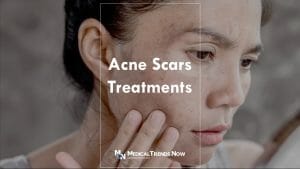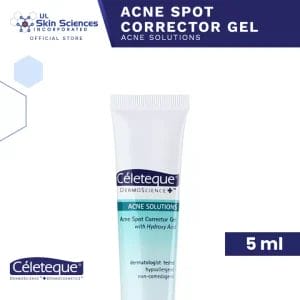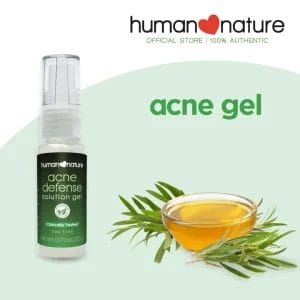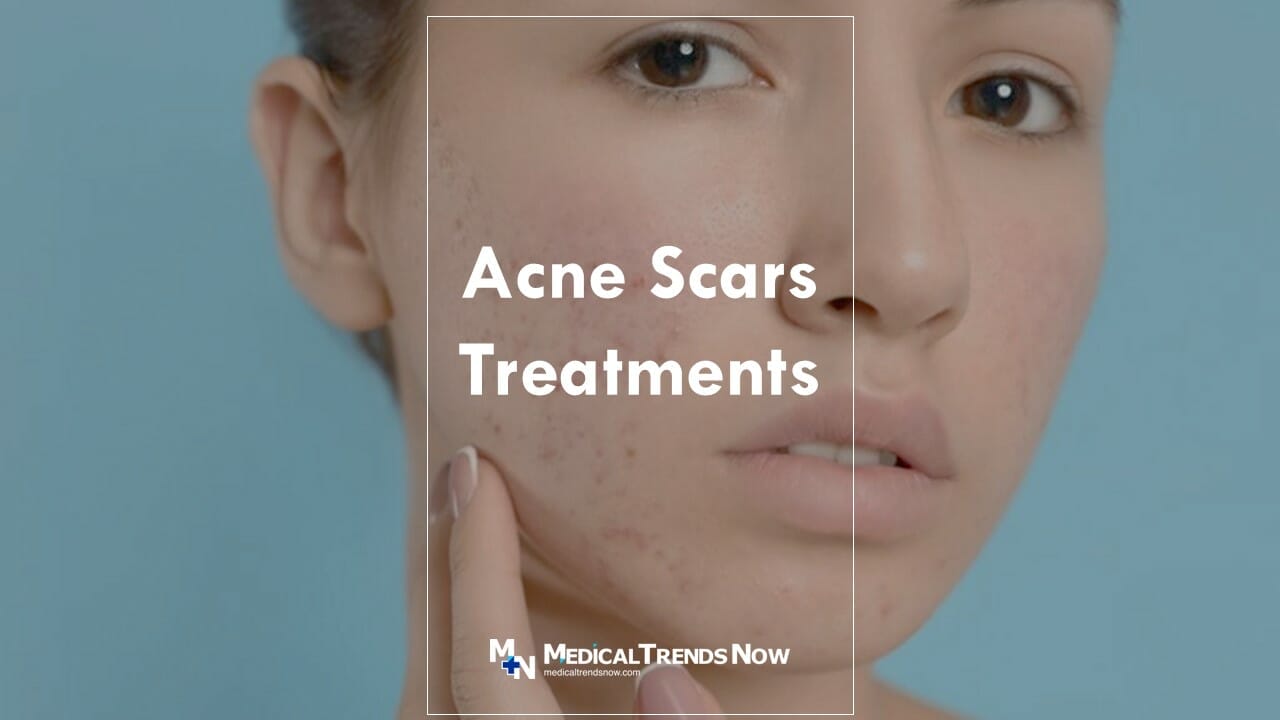Table of Contents
Acne scars can be difficult to treat, but with the right combination of remedies, you can reduce the appearance of acne scars and improve your skin’s overall appearance. Although there are no “quick fixes” when it comes to treating acne scars, there are several treatments available to help address the issue. From topical creams to laser therapies, this article will provide an overview of different treatment options for acne scars.
What are Acne Scars?
Acne scars are a common skin condition that often occurs when an individual is suffering from acne. These scars can be permanent, but there are treatments available to reduce their appearance.

Types of Acne Scars
Acne scars can have a huge effect on an individual’s self-confidence and self-esteem. They are unsightly reminders of acne, which can cause people to feel embarrassed or ashamed. There are several types of acne scars, and they vary in appearance, severity, and treatment options available.
Atrophic scars are the most common type of acne scarring. These indentations occur when collagen is lost at the site of an acne lesion due to inflammatory damage caused by too much production of oil on the skin. Other types include hypertrophic scars, which are raised nodules that form around a healed pimple or cyst; rolling scars, which appear as waves along the surface of the skin; boxcar scars that look like deep pits; and keloid scars, which grow beyond the boundaries of the original injury site.

List of Common Causes of Acne Scars in the Philippines:
Genetics
Genetics can play a role in the severity of acne and, therefore, the likelihood of developing scars from it.
The causes for both acne and its scars are varied, but genetics has been recognized as an important contributor to their development in some individuals. This is because genetics can influence how much oil your skin produces, which directly affects pore blockage and inflammation. Genetic factors also influence how well your skin repairs itself after breakouts, which determines how severe and long-lasting any scarring will be.
If you have a family history of severe or long-lasting acne scarring, it’s important to discuss this with your doctor when considering treatments for acne. With early prevention and proper treatment, you may be able to reduce the risk of developing visible or permanent damage from this condition.

Hormonal Imbalance
These marks can be caused by many different factors, but one of the most common causes is hormonal imbalance. Hormonal imbalances occur when there is an irregularity in one’s hormones, usually due to underlying health issues like polycystic ovary syndrome or thyroid dysfunction. When hormones become imbalanced, it increases sebum production, which can lead to acne breakouts and subsequent scarring.
The severity of these scars can vary depending on how quickly they are treated and how severe the initial breakout was. People with milder forms of acne may only experience small hyperpigmentation spots while those with more severe cases may suffer from cystic lesions that leave large indented scars on their faces and body.

Unhealthy Diet
One major cause of acne scarring is an unhealthy diet rife with sugary foods, processed items, and saturated fats. Eating food with a high glycemic index, such as white bread, potatoes, and sweet snacks can lead to increased inflammation in your body which in turn may contribute to scarring when pimples occur. Furthermore, excess oil produced by eating fatty, fried foods also increases the risk of breakouts and, thus, potential scarring.
Stress
Acne scars can be a major source of distress for many people, including both teens and adults. Stress is one of the most common causes of the development of acne scars. There are two main types of acne scars: atrophic, in which tissue has been lost, and hypertrophic, in which excess tissue has grown. Both forms can be caused by stress-induced hormonal imbalance resulting in increased production of sebum, leading to clogged pores and eventual breakouts.
Stress also affects skin health directly due to its role in decreasing immune system functioning and causing inflammation, which can lead to further scarring.

Poor Skin Care Practices
Poor skin care practices are among the leading causes of acne scarring. To prevent lasting damage to the skin, it is important to understand what habits may contribute to the development of acne scars.
Poor hygiene, incorrect use of products, and overuse of exfoliants can disrupt the balance of oil in our skin and contribute to breakouts which can then lead to scarring. It is important for those with acne-prone skin to be mindful about their cleansers, moisturizers, and exfoliants as some ingredients can clog pores or cause irritation which leads to inflammation that increases the likelihood of scarring. In addition, picking at pimples should be avoided as this too will increase your risk of developing a permanent mark on your face or body.
At Home Remedies
Acne scars can be a source of embarrassment and insecurity for those affected by them. The good news is that there are at-home remedies that can help reduce the appearance of acne scars, giving you back your confidence.
There are various treatments available, including topical creams, laser therapy, and chemical peels. However, these methods can be costly or require multiple treatments to achieve results. An alternative option is to use simple treatments in the comfort of your own home. Natural ingredients such as honey, aloe vera gel, lemon juice, and tea tree oil have all been found to help reduce the appearance of acne scars over time when applied directly to the skin. For best results using these natural remedies, it is important to apply them regularly and consistently over a few months period.

Treatments for Acne Scars
The best course of action for treating acne scars will depend on the type and severity of scarring.
One common treatment for reducing the appearance of atrophic (depressed) acne scars is laser resurfacing. This procedure uses a beam of light to remove layers of damaged skin and stimulate collagen production, which can help smooth out pitted or depressed areas in the skin. In some cases, dermal fillers may also be used to plump up collapsed or indented areas caused by severe scarring.
For hypertrophic (raised) acne scars, treatments like steroid injections or cryotherapy may be recommended to help reduce inflammation and flatten raised tissues under the surface.
Other Medical Treatments for Acne Scars
Fortunately, there are many medical treatment options available to reduce their appearance and help people move beyond acne.
Dermatologists can recommend both laser and surgical treatments for acne scarring. Laser therapy is often used to correct texture irregularities, while surgery can be performed to remove deeper scars such as ice pick or boxcar marks. In addition, dermal fillers like collagen or hyaluronic acid injections may be recommended for shallow depressions in the skin.
As with all medical treatments, it is important to discuss any concerns you have with your doctor before proceeding and make sure they are familiar with your unique situation and needs.

Side Effects and Risks of Medical Treatments for Acne Scars
Treatments for acne scarring exist to help patients reduce their visible marks, though it is important to understand potential side effects and risks associated with these treatments.
It is not uncommon for those treating their acne scars to experience adverse side effects from treatments such as chemical peels, dermabrasion, or laser therapy. These range from redness and swelling at treatment sites to burns or blisters. In rare cases, serious infections may occur due to improper technique or allergies related to certain products used during treatment.
Conclusion: Treatments for Acne Scars in the Philippines
In conclusion, acne scars can be a source of concern for many people. However, by understanding the causes and treatments available, it is possible to reduce or even eliminate acne scarring. Both medical and home remedies can be used, with medical remedies offering a higher chance of success in treating severe cases. It is important to note that while some treatments are more effective than others, results may vary from person to person.
Sources
- Acne scars: What’s the best treatment? – Mayo Clinic
- Acne Scars: Treatment, Removal, Best, and More – Healthline
- Acne scars: Diagnosis and treatment – American Academy of Dermatology
- How to get rid of acne scars: Treatments and home remedies – Medical News Today
- How Do You Treat Acne Scars? – Scripps Health
- Can Acne Scars Be Removed? (for Teens) – Kids Health
- Acne Scars 101: A Complete Guide to Getting Smooth Skin – Everyday Health
- Acne Scars: Causes, Diagnosis, Types & Treatment – Cleveland Clinic
Disclaimer
This website is intended to educate both members of the general public and those working in the medical field on the prevalence, causes, and methods for preventing, diagnosing and treating diseases that affect people throughout their lives. This website’s content is provided solely for informational reasons and is not meant to serve as a substitute for the advice of a qualified medical practitioner.













